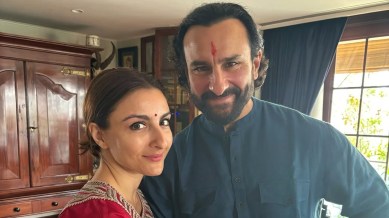📣 For more lifestyle news, click here to join our WhatsApp Channel and also follow us on Instagram
‘Didn’t see my brother for weeks’: Soha Ali Khan recalls how Saif once rejected mother Sharmila’s affection; expert on nurturing parent-child bond
Soha, as a mother herself, spoke about how being away from her own daughter, Inaya, affects her.

Striking a balance between work and parenting is a constant struggle for many mothers, and that challenge is no less real for women in the entertainment industry. Actor Soha Ali Khan recently spoke about her mother Sharmila Tagore’s efforts to juggle a full-time acting career while raising children, and how it sometimes left an emotional impact on her elder brother, Saif Ali Khan.
“Sometimes, my mother didn’t see my brother for weeks. And then, she would rush home to do bedtime with him, and he would be like, ‘I don’t need you. I don’t want you right now’ because he was also upset. So he is fine with the didi and then you are like, ‘What did I rush home for?’ And then you are so stressed about that time that you end up being short with your children, so it’s a lot,” Soha told The Hollywood Reporter India.
monthly limit of free stories.
with an Express account.
Reflecting on those early years, at the Mother’s Day event for YFLO, Sharmila herself had once said, “I was working two shifts a day and for the first six years of his life, I was really absent. I don’t think I was a full-time mom. My husband was there, but I wasn’t.”
Soha, as a mother herself, spoke about how being away from her daughter, Inaya, affects her. “Wherever I am in the world, when it’s 7 o’clock, I start to get very antsy. That’s my ritual with her, bedtime. So even when I was on set, I burst into tears once because we were in Rajasthan and we were shooting in Mandava and it was bedtime and I had not seen her all day, but that was one day,” she said.
So, how can prolonged absence due to work in a child’s early years affect the parent-child bond?
Counselling psychologist Athul Raj tells indianexpress.com, “In early childhood, a child’s sense of safety comes from presence, not perfection or big gestures, but the quiet comfort of knowing someone is there. When a parent is absent for a long time, even with good reason, the child doesn’t understand; they just feel the void.”
He adds that children protest through withdrawal when they’ve been longing too long. They push away not because they don’t care, but because caring has started to hurt. Children seek emotional reliability. When it’s missing, they may internalise the absence, making closeness feel unsafe. Still, all is not lost.
“What matters is what happens when the parent returns. If that moment is met with softness and a willingness to acknowledge the child’s hurt, it becomes an opportunity for repair. You don’t have to explain away your absence — just show you see its impact,” he states.
What can working parents do to manage the guilt and emotional stress?
The guilt working parents carry is often quiet but heavy. This doesn’t mean you’ve failed. It means you care deeply. “The trouble begins when guilt turns into shame. When parents start believing that, they either burn themselves out trying to make up for it or emotionally check out to avoid feeling the ache. Both create more distance, not less,” stresses Raj.
He adds that what helps is naming the feeling instead of fighting it. Repair matters more than presence alone. And remember, how you relate to yourself teaches your child how to relate to themselves. If you meet your imperfections with harshness, they may grow up believing love is conditional. But if they see you making room for both ambition and tenderness, they learn love can stretch and hold both.
📣 For more lifestyle news, click here to join our WhatsApp Channel and also follow us on Instagram